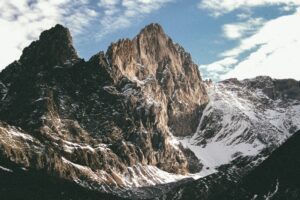Water will be more difficult to access as climate crisis progresses, study finds
Water resources will become less predictable in snowy regions across the Northern Hemisphere by later this century, according to a new study led by the National Centre for Atmospheric Research (NCAR).
Regions receiving about the same amount of precipitation and streamflow will become more unpredictable, as the climate crisis decreases snow cover and results in unreliable runoff.
Water resources will become increasingly reliant on periodic episodes of rain, which could become problematic in summer periods when heatwaves and droughts occur.

‘Water managers will be at the whim of individual precipitation events instead of having four-to-six months lead time to anticipate snowmelt and runoff,’ said NCAR scientist Will Wieder, the lead author. ‘Water management systems in snow-dominated regions are based on the predictability of snowpack and runoff, and much of that predictability could go away with climate change.’
Snowpack is already melting earlier and even declining in many regions, with scientists predicting this could lead to the amount of water contained by snowpack at the end of an average winter in parts of the U.S. Rocky Mountains dropping by nearly 80%.
These changes could also result in cascading impacts on ecosystems reliable on water from snow and could put stress on water resources, dry out soils and heighten fire risks.
However, the study assumes greenhouse gas emissions continue at a high rate and these most severe impacts could be avoided if emissions are successfully reduced.
The team used computer-based climate models to simulate how rising temperatures would change water resources by 2100.
It was found there would be 45 more snow-free days on average in the Northern Hemisphere, with regions including the Rocky Mountains, Canadian Arctic, Eastern North America and Eastern Europe experiencing the biggest decrease in reliable runoff.
‘Snow-related metrics are critical for informing society’s management of precious water resources,’ said Keith Musselman, a hydrologist at the University of Colorado Boulder and co-author of the study. ‘As utilities and civil works agencies plan new reservoirs and other infrastructure to adapt to a changing climate, we must address basic research questions about the changing characteristics of winter snowpack and resulting streamflow that we have long relied upon.’
Drier soil conditions are also expected in much of the Northern Hemisphere, due to drier summers, but some regions in East Asia, the Himalayas and Northwestern North America will maintain soil moisture due to increased rainfall.
Photo by MR WONG
















